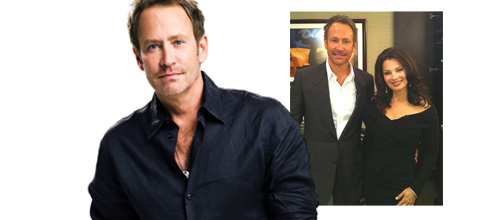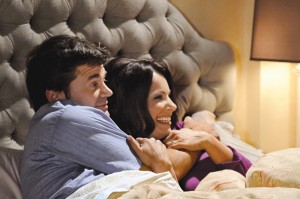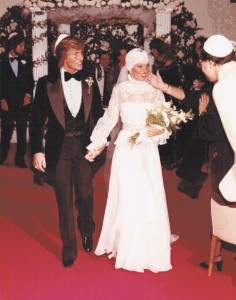
Still Fran’s Man

Peter Marc Jacobson’s relationship with his famous ex is a perfect example of the happy divorce of gay and straight—and not a bad idea for a hit sitcom
by Steven Foster
In 1978, in a high school in Queens, a young, Farrah Fawcett-winged knockout named Fran Drescher hurries down the stairs with the rest of the denim-wrapped, polyester-clad throng, on the way to Biology or Chemistry and, instead, walks straight into Destiny. Coming toward her on the staircase is a handsome schoolmate, Peter Marc Jacobson, who, with his preppy garb and feathered hair, must have looked very much like the lost Hardy Boy. Jacobson sees her and is immediately smitten. Basically, it’s a true-life Hollywood meet-cute. A John Hughes moment, before the world would actually become aware of John Hughes moments.
Suddenly, Fran Drescher opens up that voluptuous, full-lipped mouth, and the practically patented squawk that would make her a television superstar comes blaring out. A siren song disguised as grating, nasal, nonetheless charming bray.
They married shortly after graduating high school.

Fifteen years later, frustrated with the bit parts and “best friend” roles, the couple decided to create a vehicle that served up Drescher as the main course. No more sitcom side dishes. Together, she and Jacobson cooked up the recipe for stunning success: an unapologetically Jewish loudmouth from Queens as au pair to an uppercrust, motherless English family. A Mary Poppins without the hocus-pocus but with chutzpah to spare. That show, The Nanny, killed. At its high point, the sitcom was the hottest hit on CBS, attracting 15 million viewers and multiple Emmy and Golden Globe nominations and more than a few wins.
When lightning struck a second time, the bolt would land a little bit closer to home. Happily Divorced, about a gay man and his wife dealing with his coming out and their post-divorce life, is not-so-loosely based on Drescher and Jacobson’s real life. And it’s a Hot in Cleveland-size hit for TV Land. Just as this issue was going to press, the netlet, angling to be a full-fledged network now, greenlit a second season—after the show had only aired five times. This being the practically vacuum-sealed TV Land, the show, with its live studio audience and four-camera setup, is played for laughs. But as OutSmart discovered, the real-life scenario on which it’s based entailed more heartache and depth than a 22-minute sitcom can explore.
Steven Foster: Looks like TV Land’s got another hit on their hands, thanks to you.
Peter Marc Jacobson: Well, thanks to them, too. They’re great to work with.
Didn’t you break with a 4.4 million? And you’re still pulling 2.5 or something like that.
Yeah, we’re doing really well. It’s different with cable because a lot of [the ratings] are measured three days later with the amount of people that watch it on DVR. But we’re thrilled people love the concept. And, of course, people love Fran. And the show’s getting better and better. And we have a wonderful ensemble. It’s been a blast. I mean, to be able to do it once and then blessed to do it again…

Let’s talk about the creative gestation of the show.
Fran and I actually went on a vacation together to Europe, and we sort of fell back into our old habits of being husband and wife. She was late for dinner, I’d start annoying her, then we’d get into a fight, and then we’d start laughing about it. We looked at each other and thought, This would be a funny movie. These two people who aren’t married and decide to go on a vacation together. We called it Happily Divorced and started writing. Then Fran had a meeting at TV Land to pitch some of her ideas for shows, not particularly with her in it. They said, “Just out of curiosity, if you were to do a show, what would you wanna do?” She said, “Well, probably a show about my relationship with my gay ex-husband and myself.” Then she said, “Do you want to hear my other ideas?” And they said, “No, we just want that one.” It was done over lunch.
You can’t script something like that.
I know. It’s like one of those Hollywood stories you wish for.
Some of the reviews, however, have been less than kind, taking you to task with everything from being overly stereotypical to accusations of playing fast and loose with the real consequences of divorce, especially when a gay spouse is involved. How do you respond to those criticisms?
You know, here’s the thing. It’s a pilot. When you’re doing a pilot, you’re trying to sell a show to a network looking at the demographics of who will be watching the show, the relationships of the people in the show, where the humor might be coming from. If you continue to watch the series, she has moments where they get into big fights about how she feels like her life was wasted, that her youth was wasted. He wonders what it’s gonna be like because he’s in his 40s and now all of a sudden he’s gay and he doesn’t know how to do it. It’s a slow process.
That’s fair. No one remembers that Cheers was in the bottom of the ratings barrel in its first year.
Seinfeld was on three years before people watched it!
Exactly.
You don’t get those chances anymore. Television is a totally different animal than when we did The Nanny.
What about critiques about being too stereotypical with the “gayness”?
When you’re doing a series, you have to hit the jokes a little harder, hit the themes a little harder. So it may be a little more stereotypical than it will [become] as the characters grow, but you have to tell the audience who these people are right up front. If you wanted to say something was stereotypical because a gay man likes musical theater and likes to dress well and go to the gym [laughs], you’re calling me a stereotype. But I don’t think he’s a stereotype. I just think he’s a good, loving person who loves his ex-wife, but discovering who he is and is trying to figure it out. Maybe some of his interests are a little more stereotypical. But that doesn’t mean it’s a bad thing.
Are you and Fran trying to do something more with this show? At times it feels like there’s, I don’t know, something more substantial trying to break through.
I received this beautiful letter today that said, “I think you guys are actually onto something bigger than the show because this is exactly what happened to me and my ex-wife. And we’re best friends now.” And this seems to be in our generation. A lot of couples have gone through this at some time in their life—whether it be boyfriend/girlfriend—because men who grew up in the ’70s and the ’80s, or in different parts of the country even, weren’t given a choice. You were straight, basically.
But you weren’t.
I guess I was somewhere in the Kinsey scale where I was attracted to Fran and I loved her and I wanted to be with her. So I took that choice at that time in my life to go down that route because that’s what I was taught and that was the only option really there was. I didn’t even know what gay really was. [Beat] In Flushing.
Ultimately, it was her decision to divorce, wasn’t it?
Yes.
And you were angry, weren’t you?
Yeah, I was really angry. Because when we were married, I was not acting out or having affairs or anything like that. I was living a straight life. But when you hide who you truly are and bury it down, your anger comes up in insidious ways. And for me it was control, and I was very Svengali-esque toward Fran and trying to control her—the way she looked, the way she acted, what she did, how she presented herself. Everything. And she was so tired of the behavior. I kept saying I would change, but then I would start that behavior again, and it was really because I wasn’t being my true self. And she finally said, “You know what? I wanna find out who I am and I wanna be alone.” I really didn’t wanna do that, and I was very upset with her.
We got divorced, I moved to New York, and I didn’t speak with her for a year until her manager called to tell me that she had cancer. All the anger immediately lifted, and I just wanted her to know that I would be there for her, to take care of her, or stay out of her life—whatever she wanted—but to know that I love her. And that was sort of the beginning of our friendship again.
How did she find out you were gay?
I called her because she was going on a book tour, and I said, “Listen, I know you’re going on a book tour, but I just want you to know in case this comes up in the press for some reason.” I didn’t even say “gay” then. I said, “I’m starting to date men now.” She was already dating another guy and was in love. I had told her halfway through [the marriage] that I thought I might be bisexual, but I love her and I don’t want to have an open marriage or anything.
How did your parents act when you came out?
Well, my parents were gone. At this point, I’m an orphan. I don’t have brothers or sisters or aunts and uncles, so when it happened, I was alone. I didn’t have a family. That was part of the hard part too, because I felt like I was losing Fran’s family and that was my family because I didn’t have any. The family was ending, the show was ending, the marriage was ending. It was all happening over a period of time where … I spent a lot of time crying.
That’s heartbreaking.
Yeah, well, everybody’s got their stuff. But, yeah, it was hard for me. It was sad. I would writhe on the floor for a long time. Every night.
Have you been in love since Fran?
There have been people that I thought I was in love with that … didn’t love me back. [Laughs] But in my head we’ve had an amazing relationship.
[Laughs]
We’ve gone on vacations, I bought him a lovely watch. But I’m still actually waiting for him to return my call.
Spoken like a true comedy writer.
But true. That’s the sad part.
As a writer, how much of your actual history informs the show? I know it’s a sitcom, but sometimes lines just seem to resonate with an almost historic clarity. The Mexican cruise episode, for example, when Fran’s character and the Peter character realize that they’re staying together, not simply because they care for each other but, in fact, because they’re afraid of being alone.
We do use a lot of our own experiences and things we went through. She was afraid to be alone. Fran found out later through therapy. I tend to be dense when a guy is trying to come on to me and miss it. We use that, for example, in future shows. As they say, write what you know.
You’ve been on Oprah twice. The first time was in 1996 when you were still married and Ms. Winfrey surprised your wife by bringing you out to join her. The following exchange happened:
“Look at them,” Oprah beams. “Look at them!”
As the couple embraces, Drescher admits she didn’t know Jacobson would be joining her.
“You didn’t know, though?” asks Drescher.
“Yeah, I did,” Jacobson admits.
“You did?!”
“Yeah.”
“God,” says Drescher. “I must be the easiest person to pull somethin’ over on.”
Looking at that now, it seems so loaded with portent. Any comment?
I honestly don’t remember the first Oprah moment. I haven’t seen it in years, and at the time I doubt that I thought it awkward since I wasn’t trying to pull the wool over anyone. I was just trying to live the life I thought was the right one for me.
On a lighter note, the second time you were on was this year, well after you both were divorced and you had come out. Fran says she found her post-you dating life disappointing because you were, and I quote, “very well proportioned.” She basically said you were hung like a horse. You turned beet red.
It was a funny story and I did blush. And I didn’t even get a date out of it. [Laughs]
Oprah’s not the only time you’ve been in front of the camera. You had a part in Spread, right?
Oh, yes, the Ashton Kutcher film. I played a plastic surgeon who does vaginal rejuvenation on Anne Heche.
Now that’s a good line.
You know, it was funny. It was during the writers’ strike and my manager called me and this very big casting director remembered me. Now, it’s been 15 years or so since I’ve been acting. But he called and said, “Would Peter be interested in doing a role in this Ashton Kutcher film?”
Well, first of all, I get to meet Ashton Kutcher, and I said, Sure, why not? Thinking they were offering me the part when actually I had to go to an audition where there are 400 people who look just like me, and I’m thinking, Why am I putting myself through this? Then I auditioned. And immediately when I left I started thinking I should have done it this way and done this instead, torturing myself.
Why did you even care?
Exactly. I started saying to myself, You’re a successful man, it doesn’t matter! Forget it!, but, of course, checking the phone every 15 minutes. Then someone called and said, “You got the part,” which I was thrilled about. But it took me forever to learn the lines which, when I got to the set, they completely changed, and I panicked.
Then Ashton Kutcher, who is the most handsome man in the world, came onto the set and I’m just standing there staring at him and thinking, Damn, you’re good-looking. I’m not even thinking about what I’m saying. But we got it, we did it, and it wound up being one of the funniest scenes in the movie. [Beat] But since then the phone hasn’t rung.
Screw it, you’ve got a much better deal on TV Land.
Exactly. Every day I walk through this lot I’m still in wonder that this kid from Flushing, Queens, made it past Baskin-Robbins.
Happily Divorced airs on TV Land (tvland.com) on Wednesdays at 9:30 p.m., with repeated airings throughout the month.
Steven Foster is a regular contributor to OutSmart magazine.











Comments